Latest Contributions
My great-grandfather: the Dewan of Pratapgarh and Barrister-at-Law
Category:
Tags:

Tilak Mathur is a PhD in English Literature with specialisation in the British poet and playwright T. S. Eliot. Tilak is very actively engaged with social and charitable work in and around Jaipur. Basically a homemaker, she came into her own as a natural leader when she got an opportunity to lead. She lives in Jaipur with her husband Subhash. She often travels to Ahmedabad and USA where her two sons, daughters-in-law and grandchildren live.
When I was a child, my mother, Rummni Devi Bhatnagar, narrated many stories about her Nanaji (her mother's father), Shri Gauri Shankarji, a Barrister stationed at Ajmer. What fascinated me was not his profession. I was more awed by the description of one his havelis and tam tam (4-horse carriage). My interest in his background grew when my son Gaurav became a lawyer. I was happy to have a pedigreed advocate
Recently, at a family meeting in Ajmer, I became aware of a handwritten document that had been written about Gaurishankarji by his son, Shri D. G. Verma. (The document was with Shri Surendar Shankar Bhatnagar, son of Shri D. G. Verma. Shri Bhatnagar, now about 93 years old, lives in Ajmer, and is still quite active. He has provided all the materials and photos in this story.)
The document appears below. As you will see, several parts of the document are illegible, and there does not appear to be a proper conclusion. Still, it tells a fascinating tale that Is more than 125 years old.
This document does not talk about the large amount of land Shri Gauri Shankarji had in Akhri village in Ajmer.
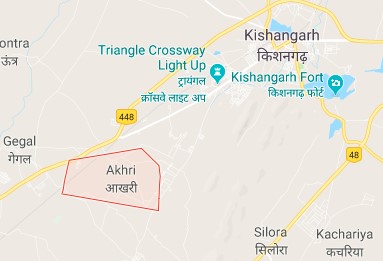
Map 2018.
When my older brother Subhash - we call him Bhaiya - was a student of Mayo College, Ajmer in the late 1950s and early 1960s, Bhaiya and his friends used to go there occasionally on their bicycles. Bhaiya told me stories of snakes in many parts of the haveli there.
D. G. Verma Lohagal Road
AJMER
Dated 29th December 1968
My father Mr. Gaurishankar G. Verma, Barrister-at-Law, was the 2nd son of Lala Ganeshilal Bhatnagar, Kayasth (kayasth is a caste identifier), Rais (rais means landloar) and landlord of Rampur in Saharanpur, (U.P.) My grandfather was brought to Rajputana by Col. Saunders, and was posted as Tehsildar Ujjain (Malwa) and ultimately made Tehsildar Ajmer.
Father was born at Todgarh in the year 1874 on 5th April and after grandfather's death, when father was 8 years of age, he and my uncle Mr. Jawaharlal aged 6 years were brought up my uncle Munshi Shiv Prasad, their elder brother.
Both Father and Uncle Jawaharlal were put to school together and so good was their training that they maintained their ranks in all the classes as 1st and 2nd. Uncle Shiv Prasadji was a great admirer of Swami Dayanand Saraswati and took a took a leading part in establishing Ajmer Arya Samaj. Most of the Arya Samaj buildings in his (uncle's) time. It was natural for Father to follow in the lines of his elder brother, and he (Father) too in the course of time became a prominent member of the Arya Samaj.

At the age of 16 years, Father was married, having passed the Matric Examination in the 1st Division. In those days boys took their studies very seriously, and whatever was taught was made so as to make a mark in their lives. Hence, Father had learnt from the European Principal of the Government College Ajmer (Mr. F. L. Reid) not only the book elements but civic manners, punctuality, correct pronunciation, and a love for the three R's.
He had given his intermediate (F.A. - a degree between high school and BA) final examination and was awaiting the result when an incident brought him in the view of Pandya Mohanlalji, the Dewan of Pratapgarh State (Rajputana). Pandyaji had given my uncle Shivprasadji a draft of a representation to be submitted to the Government (British government, which had a strong say in what happened in Princely States) on behalf of his State. Uncle asked father to go through this. Father, after having read it, wrote a fresh one, and when Uncle asked him how he liked the draft, father whilst ????? of Pandyaji's draft, said that he had tried to write one also.

Uncle went through father's compositions and liked it so much that when Pandyaji came, Uncle showed father's draft to him. It was decided that Father was to be appointed as tutor to the Maharaj Kumar of Pratapgarh, if His Highness (after consulting with the Agent to the Governor General of Rajputana) approved. And, thus, in the July of 1892, Father was appointed as Tutor Guardian at the Mayo College (where the Maharaj Kumar was a student).
(Father) Passed the F. A. examination in the 1st Division.
With the permission of the Principal of Mayo College, Father joined the B.A. class at the Government college. So when Father's ward was at school, the Guardian was attending his college.
In the year 1894, Father graduated from the Allahabad University in the 2nd Division, with Distinction in Persian.
He remained as Tutor Guardian for three and a half years and on the Maharaj Kumar leaving the Mayo College, Father contemplated of seeking some other appointments but H. H. (His Highness) Pratapgarh asked him to accompany Maharaj Kumar to Pratapgarh and spend the vacation there.
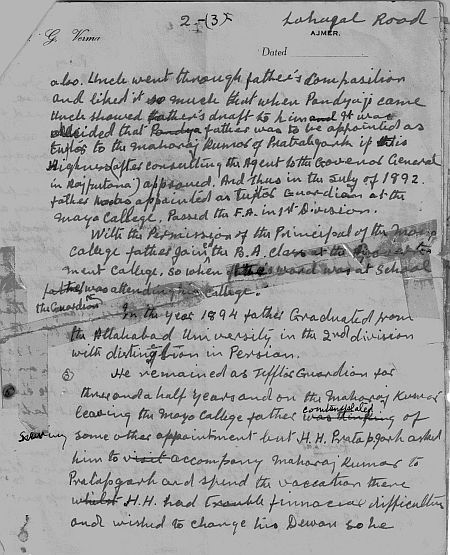
H. H. had some financial difficulties and wished to change his Dewan, so he consulted the Political Agent (Mr. ???? ????), who suggested that Father be appointed. H. H. also approved this, and thus Father was informed by H. H. of this. Diffidence made Father write to elder Uncle for his opinion and only when he received Uncle's letter of approval, did he feel strong enough to accept the responsibility of a Dewan.
The hesitancy and diffidence arose because the State was in debt and Father's young age. There was a great deal of heavy intriguing by the local people, who wanted that somebody from amongst them should be appointed.
Within three years, Father had managed to clear all the debt of the State, and at the end of his tenure in 1904, the State had a surplus. H. H. insisted very much on Father continuing as Prime Minister. He even promised to increase the pay but Father had made up his mind not to have any further service, however lucrative it may be. And his reply to H. H. was that I have addressed you as "Master" but I will not do so to anyone else now. I wish to take up an "independent profession."
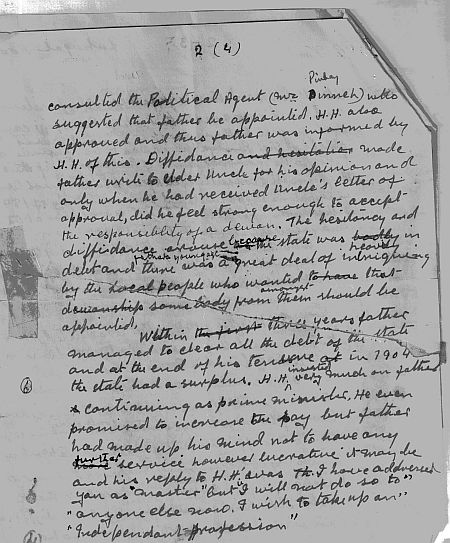
During the period of about 9 years' service, he had made himself known to most of the officials, ruling Princes, and the nobility as well as the prominent persons of Rajputana Shymaji Krishna Verma, Dewan of Udaipur, Mr. Ram Gopal Barrister, D. B. Harbilas Sarda, Hirachand G. Ojha. The first became intimate friends. Shyamji was a man of a very independent and bold nature and he gave up the Dewanship and went to Switzerland as ultimately he held that India should be made Independent and the British should leave India.
After Pratapgarh, Father came to Ajmer and by this time, the three of us, i.e., two sisters and myself had become 8 years (Sita Devi), 6 years (Kunti Devi - who became Tilak Mathur's mother's mother) and 4 years of age.
Father joined the Allahabad College Law class and his stay there brought him in contact with Mr. Sachidanand Sinha, Sir T. B. Sapru, Mr. Motilal Nehru, Mr. Chaudhari - all of them were coming in prominence as lawyers and public men in the United Provinces of Agra and Oudh..
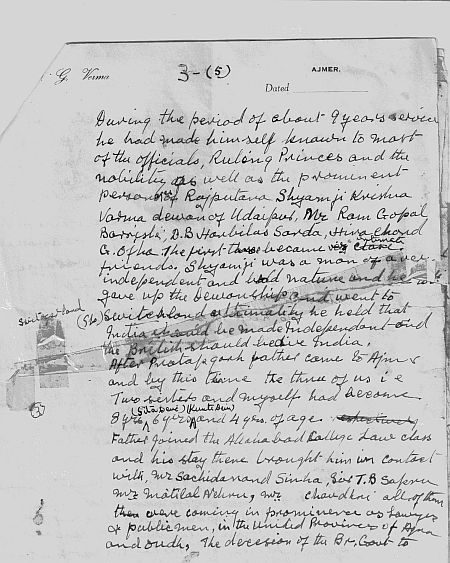
The decision of the British Government to divide Bengal into two provinces brought about a very strong opposition by the Bengalis, and their agitation spread in most of the other provinces of India. After Bengal, it was markedly ??? in Punjab and Maharashtra
National feelings and the fact that India was under the rule of foreigners aroused in many people. The agitation became known as the Swadeshi movement.
Father also developed a strong desire to help to secure the country's freedom, and he vowed to wear swadeshi-made Banians which were sewn by mother.
Father got his admission to the Middle Temple London to study Law, and so he gave up his studies at Allahabad and booked his passage to London. Mother, who was of a forceful nature, insisted that she too would accompany Father, and it was decided to send both my sisters to Dehradun under the care and guardianship of Mrs. Mahadevi ???, our Aunt (a cousin of Father) who was the founder of ....
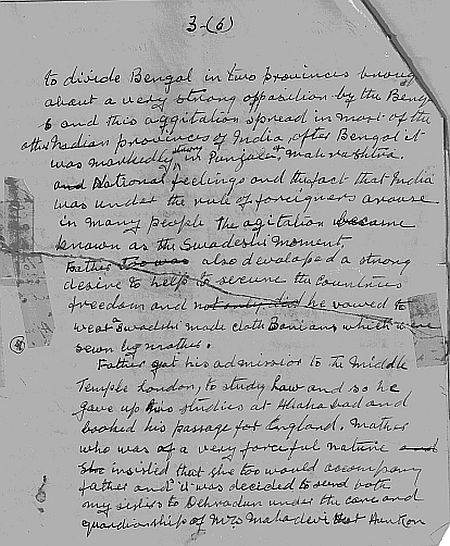
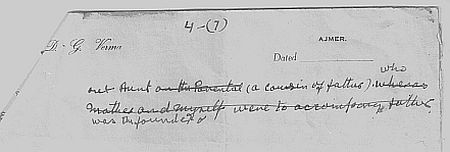
********************
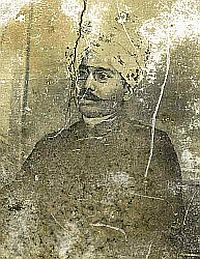
Gauri Shankar Verma. Dewan Pratapgarh. Circa late 1890s.
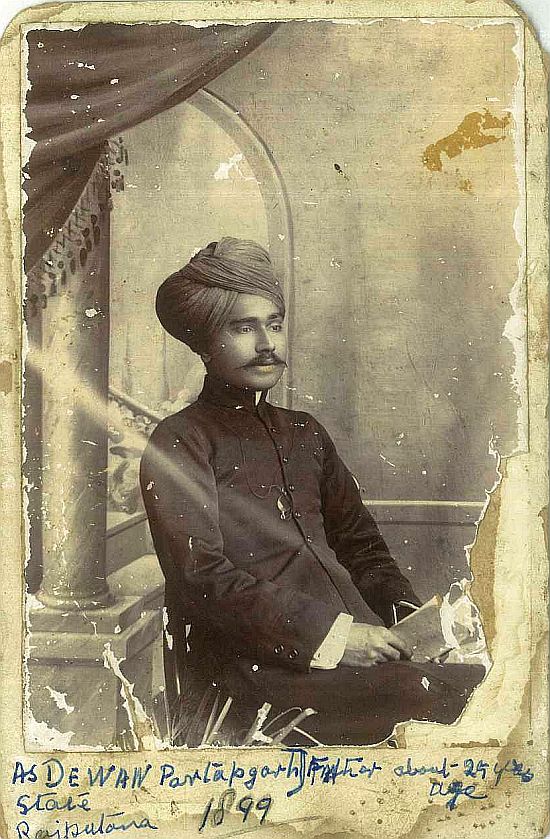
Gauri Shankar Verma. Dewan Pratapgarh. Circa late 1890s.
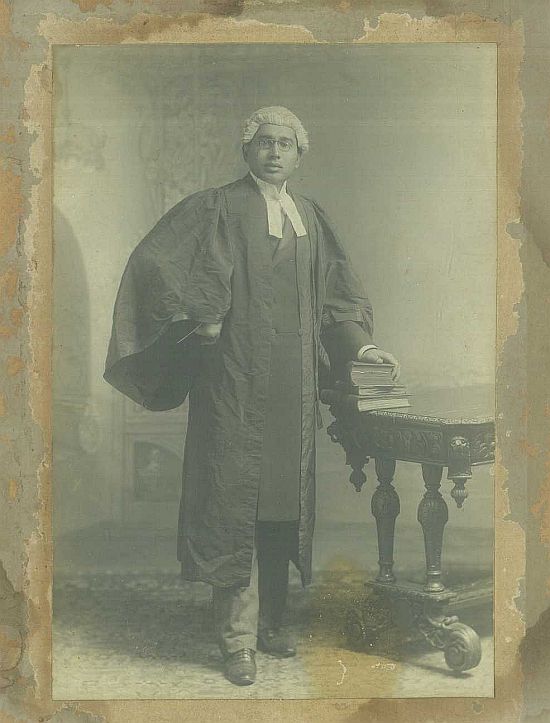
Gauri Shankar. Barrister. London. 1907.
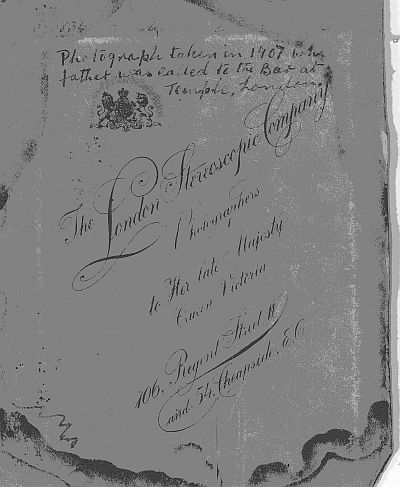
Reverse side of above photo of Gauri Shankar Barrister. London. 1907.
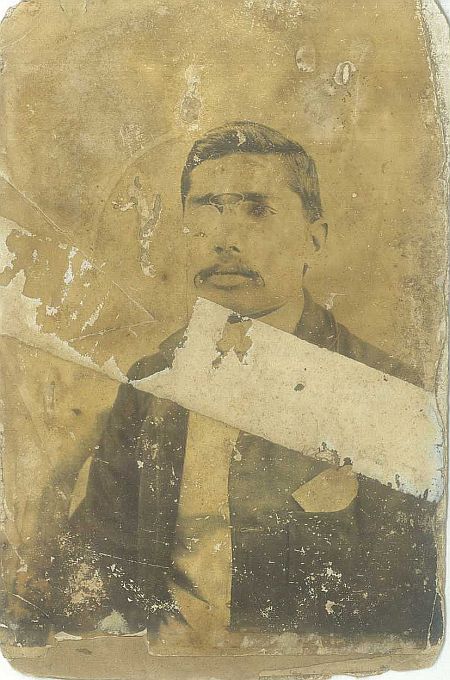
Gauri Shankar Barrister. Ajmer
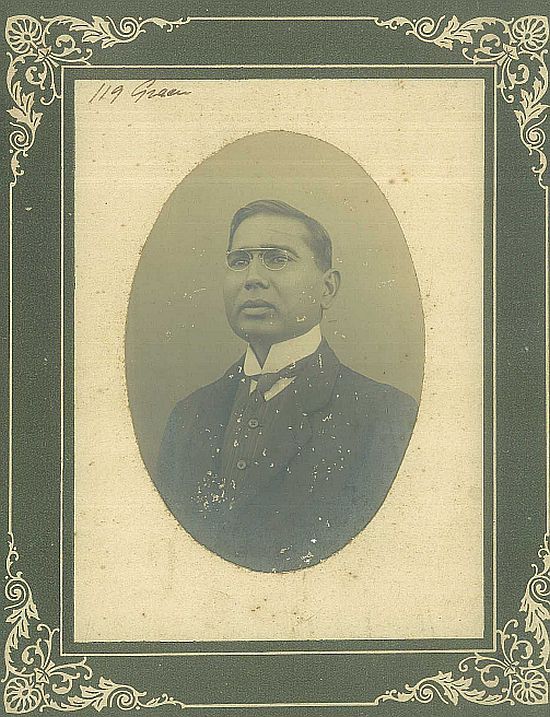
Gauri Shankar Barrister. Ajmer. 1913 or 1914
_______________________________________
© Tilak Mathur 2018
Comments
Add new comment